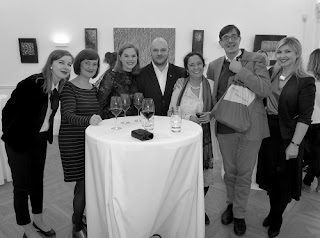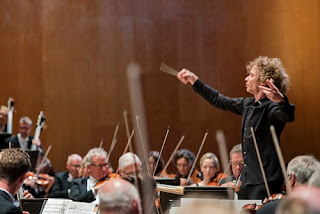I get no medal for having predicted, in my Arts Desk review of Santtu-Matias Rouvali's December 2018 Strauss concert, that either he or Jakub Hrůša would be appointed to succeed Esa-Pekka Salonen as the Philharmonia's Principal Conductor in 2021. Hrůša is the more experienced of the two, and a deep thinker open to ideas in interview - one of the most memorable I've ever had the pleasure to be granted - but apparently the players found him 'too demanding'. So they've gone for the wow factor and the mad hair (straight as a dye in a photo I found of SMR in his student days). All recent images here by Camilla Greenwell for the Philharmonia.
Two further performances in just over a week gave me a chance to discover further what makes Rouvali tick (in interview, he's surprisingly nervy and a bit evasive, or that may be a language thing). Biggest asset: he shows that natural sense of freedom/rubato and the ability to quicken or slow the pulse in an instant. Abbado, Haitink, the Järvis, Mirga Gražinytė-Tyla and Yannick Nézet-Séguin all have it; Rattle and Salonen don't.
The interpretation I heard of my favourite Strauss tone poem, the Symphonia Domestica (alongide Don Quixote, which I know is objectively the finest), launching Gothenburg's fabulous Point Music Festival was mostly miraculous. All the better, too, for coming from that most refined of symphony orchestras - stringwise, to my mind, up there with Berlin, Amsterdam and Vienna - in a hall which really allows big sounds to breathe and not attack you like an angry rice pudding (as my nearest and dearest once said of an Ashkenazy Alpine Symphony in the Royal Festival Hall).
As I've already stated in my Arts Desk roundup, Rouvali's genius was at its brightest in the difficult ebb and flow of the huge slow movement. And then, as the crazy family-reunion grand finale should goes up a notch in fruitcakiness to sehr lebhaft (crotchet = 116), Rouvali kept it steady. No wonder people were criticising the work itself for going on too long. The parody of the Beethovenesque not-knowing-when-to-stop can only succeed if it's wild. Yes, the horns got their insane whoops right, but that's not the point. A fall at the last hurdle.
The following Thursday, the Philharmonia were using his latest concert here to celebrate the appointment (didn't hang around much at the Ballroom 'welcome', too many platitudes being spouted). It began sensationally, with a deliciously layered account of Adams' perfect curtain-raiser The Chairman Dances. Pekka Kuusisto seemed a bit too muted - not literally - for the overloud brass in the opening movement of Stravinsky's Violin Concerto, and saved heartfelt expression for the beautiful homage to Bach which proves the work has soul.
Petrushka was bound to be a brilliant showcase for Rouvali's sense of refined colour, as the Musorgsky/Ravel Pictures at an Exhibition had been in an earlier Philharmonia spectacular. He favoured tone-painting and conductor's tricks over storytelling, which was fine on its own terms. All solos were flawless and characterful; the trumpeters were going great guns. Then, after the Rite-ish onrush of the Masqueraders - swelling trill; finish. The concert ending, which I'm sure Stravinsky must only ever have intended for performance of the orchestral 'three pieces'. No pathetic death, no ghost on the roof.
This shock happened to me only once before, in a BBCSO/Bělohlávek Prom for which I'd prepared the nine-year-old son of a friend I took as guest. I was aghast then that he didn't get the full story, and I went into a spin here. What kind of musician does that? Surely only one without theatrical instinct. Rouvali partly redeemed himself with a virtuoso performance on the 'bones' with Monti's Csardas (accompanied by the wonderful Liz Burley, superb in 'Petrushka's room'). But I'd much rather have had the last five or so minutes of the ballet. My Arts Desk colleague Bernard Hughes hit the nail on the head (which means I totally agree with him).
Redemption, then, on his SMR's first recording with the GSO, which I finally listened to. Hair standing on end from the first string tremolos of the young(ish) Sibelius's first movement onwards. A magnificent performance from start to finish. Let's hope for more like this, and no deflationary endings. Which reminds me that there won't be anything deflationary about the greatest living conductor, Bernard Haitink (pictured below at the Barbican in March by Mark Allan), bowing out in September.
He's decided that a Lucerne appearance will be his last, having celebrated his 90th birthday with the LSO in style. Wise self-knowledge to the end (of his professional career, that is; may he enjoy as many more years as he wants feeding his endless curiosity). I'll never forget his totally inspirational masterclasses in Lucerne, his Bruckner 4 or Beethoven 6, among the most recent performances, and so much else going further back. Don't miss the Vienna Philharmonic Prom on 3 September; queue for an Arena place (£6) from noon if necessary. I did just that for Bernstein and the same orchestra in Mahler Five, and that's a concert which likewise I'll remember as long as I live.




























